Edie Melson's Blog, page 331
September 21, 2016
5 Singing Lessons for the Writer
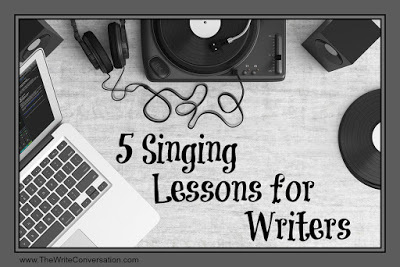 5 Singing Lessons for Writersby Katy Kauffman @KatyKauffman28
5 Singing Lessons for Writersby Katy Kauffman @KatyKauffman28Every time I hear an incredible Christian soloist, I think, I want to write like they sing. The power in their voice, the soul-stirring words, the motivation I feel to live for God—it’s inspiring. I’ve always wanted to be a singer; however, God didn’t bless me with a singing voice. But He has called me to write.
Have you ever read a book, an article, or a blog post, and heard a “song” in it? Did the words powerfully stir your soul? Could you hear the melody behind the lyrics? Did the message stick with you like a favorite song? We can write like that. The question is how.Even if someone has a beautiful voice, they have to develop it. They have to take lessons and practice. They have to learn both the technical aspects of singing and the artistry of it. So do we as writers.
It takes time to learn how to sing as we write. But the time you invest produces beautiful results. Use the following “lessons” to fine-tune your writing so people hear the melody in your message.
5 Singing Lessons for the Writer
1. Try out your voice, no matter how shaky it is.
Write down your first thoughts about your subject, so you can get them on paper or in your computer. Just a few pages or so. Say what you want to say to your target audience.
2. Breathe deeply, inhaling beautiful melodies and exhaling fresh ideas.
Take the time to read a little of your favorite authors’ books, so you can analyze their style. Note their word choice, cadence, and voice (tone). Then write down ideas for your own book. How “down to earth” or “poetic” do you want your wording to be? How often do you want to use short sentences versus long ones? What tone do you want to have toward the reader?
 Tune your voice to inspiring, encouraging, and
Tune your voice to inspiring, encouraging, andsoul-stirring; and adjust your lyrics.3. Tune your voice to inspiring, encouraging, and soul-stirring; and adjust your lyrics.
Refine your voice in your writing to sound like the inspiring authors you love, but remember to let your own personality shine. There’s only one you.
Look at your wording and replace mediocre nouns and verbs with vivid ones. Mix short and long sentences for comprehension and cadence (to sound good to the “ear” of the reader). Use short sentences to emphasize a point or end a paragraph. They’re dramatic.
4. Read your writing aloud, and listen for the melody.
Do your words flow well? Do the syllables and sentences form a pleasing cadence to your ears?
If you get stuck trying to make the words sound melodious, read a few sentences by your favorite authors again. Don’t just focus on the words and grammar, but let the feel of the words sink in. Fine tune your own wording to reflect the feelings you want to stir inside the reader. Don’t fall into the trap of becoming melodramatic, but never divorce writing from emotion. Emotions stir us to act on what we have read.
5. Before you publish your “song,” ask a friend if they can hear the music in your writing.
Are they inspired by what you wrote? Can they hear the melody in it? Do they appreciate the lyrics? Keep tweaking your writing and getting enough feedback to know when your song is ready for the stage.
Remember: practice, practice, practice. Every artist becomes better with practice, either with the microphone or the pen. Ask God to help you know how to craft your message, and trust Him for an opportunity to sing.
Tell us in the comments below what makes someone’s writing sound like a song to you. Keep singing, and don’t forget to join the conversation!
TWEETABLESMicrophone or pen, every artist becomes better with practice - @KatyKauffman28 (Click to Tweet)
5 Singing Lessons for the Writer - @KatyKauffman28 on @EdieMelson (Click to Tweet)
 Katy Kauffman is an award-winning author and a co-founder of Lighthouse Bible Studies, a ministry which seeks to connect people to God through His Word.
Katy Kauffman is an award-winning author and a co-founder of Lighthouse Bible Studies, a ministry which seeks to connect people to God through His Word.
She has taught the Bible to women and teens, and has two published Bible studies for women, 2 Timothy: Winning the Victory and Faith, Courage, and Victory which won the 2016 Selah award for Bible studies. She is an editor of Refresh Bible Study Magazine and the designer of Broken but Priceless: The Magazine. She makes her home near Atlanta, Georgia.
Published on September 21, 2016 01:00
September 20, 2016
How to Fight the Comparison Battle
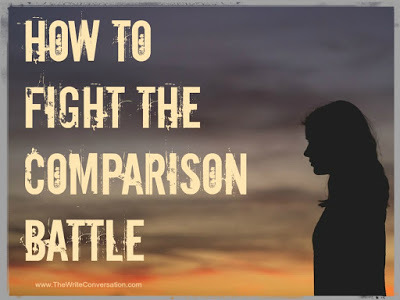 by Lucinda Secrest McDowell @LucindaSMcDowel
by Lucinda Secrest McDowell @LucindaSMcDowel“Why did she get a book contract before me when I’ve been writing longer than she has?”“I sent the retreat committee my topics and video clips, but they chose a much younger speaker with almost no experience.”“Our books were published the same month, yet his already has 300 Amazon reviews and I haven’t even hit fifty yet.”“I don’t understand why I wasn’t asked to return as faculty when John serves at the conference every year.”“I love rooming with my friend Jane at writers’ conferences, but it’s hard when she tells me every night about the editors and publishers who are interested in her projects.”“We have the same publisher, but they spent a fortune on her marketing and I was pretty much left to fend for myself.”
Compare.
Because it is simply a dead end.
Personally. Professionally. Spiritually.
God has called you to follow Him, glorify Him and further His kingdom through the unique story you are living and sharing.
And you have this promise: “His divine power has given us everything we need for a godly life through our knowledge of him who called us by his own glory and goodness.” (2 Peter 1:3 NIV)
“So, Cindy, if we already have ‘everything we need’ then why do we not see the fruit of our labors—the speaking engagements, the numerous blog followers, and the published books?”
I don’t know. But God knows why. And He also knows how and when He will use you to touch people with your message. Can you trust Him for that?
 Because it will be your message, not hers.
Because it will be your message, not hers. A chance to live out the grace you received as a free gift. Paul challenged us with “What do you have that you did not receive?” “Isn’t everything you have and everything you are sheer gifts from God? So what’s the point in all this comparing and competing – you already have all you need.” (1 Corinthians 4.7 MSG)
Grace-filled writers and speakers know this hard lesson. We were created, redeemed, and sustained in order to live our unique story – yes, with all the mess, mistakes, meanderings, miracles and even mundane magnificence.
Those who need to hear/read it will be put in our path by a sovereign God.
Her success does not mean my failure.
There’s enough ministry to go ‘round. Some of it will be very public and some will be virtually unseen. But it’s all worthy, when done in the name of Jesus Christ.
Every time we compare our writing and speaking with someone else, we are in danger of believing the lies of rejection—that our own life and message is not important. I assure you, this is a universal dilemma. Author Lysa Terkeurst’s new book “Uninvited” has spent the past four weeks on the New York Times Bestseller list as a testimony to the hunger for healing in this area.
You are not alone.
My friend Jennifer Dukes Lee assures us that everyone suffers from comparison. “The person you’re measuring your life up against? She is measuring her life against someone else’s. And someone is comparing herself to you! It’s a whole cycle of comparison that doesn’t end until someone says enough is enough.”
Okay, I’ll say it, “Enough is enough!”
Here’s how I fight the comparison battle:
Truly believe that I am loved and chosen by God. Obey what He is calling me to do and be. Write and speak my own passion and message. Encourage, promote, and lift up that other sister or brother in Christ who is seeking to live their message. I go first. I pray to be a generous and grace-filled person. You were not created to be her.
Isn’t that a relief? Now, go forth friend, and seek to become the very best version of yourself, by God’s grace. He has already given you “everything you need.”
TWEETABLES
How to Fight the Comparison Battle in Publishing - @LucindaSMcDowel (Click to Tweet)
Another's #writing success doesn't mean my failure - @LucindaSMcDowel (Click to Tweet)
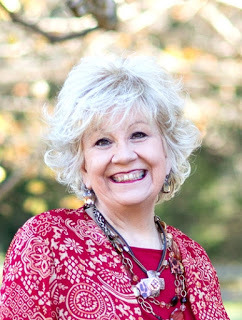 Lucinda Secrest McDowell, M.T.S., is the author of 12 books, contributing author to 25 books, and has published in more than 50 magazines. Her books and studies include: Dwelling Places and Live These Words. A graduate of Gordon-Conwell Theological Seminary and Furman University, she also studied at the Wheaton Graduate School of Communication. A member of Advanced Writers and Speakers Association (AWSA), Lucinda received Mt. Hermon “Writer of the Year” award and blogs monthly for The Write Conversation. Cindy has served on faculty at Blue Ridge Mountains Christian Writers Conference, Florida Christian Writers Conference, Greater Philadelphia Christian Writers Conference and co-directs "reNEW ~ retreat for New England Writing." Lucinda is a storyteller who delights in weaving grace and mercy into ordinary life situations. Known for her ability to convey deep truth in practical and winsome ways, she writes from “Sunnyside” cottage in New England. She blogs weekly at www.EncouragingWords.net
Lucinda Secrest McDowell, M.T.S., is the author of 12 books, contributing author to 25 books, and has published in more than 50 magazines. Her books and studies include: Dwelling Places and Live These Words. A graduate of Gordon-Conwell Theological Seminary and Furman University, she also studied at the Wheaton Graduate School of Communication. A member of Advanced Writers and Speakers Association (AWSA), Lucinda received Mt. Hermon “Writer of the Year” award and blogs monthly for The Write Conversation. Cindy has served on faculty at Blue Ridge Mountains Christian Writers Conference, Florida Christian Writers Conference, Greater Philadelphia Christian Writers Conference and co-directs "reNEW ~ retreat for New England Writing." Lucinda is a storyteller who delights in weaving grace and mercy into ordinary life situations. Known for her ability to convey deep truth in practical and winsome ways, she writes from “Sunnyside” cottage in New England. She blogs weekly at www.EncouragingWords.net
Published on September 20, 2016 04:42
September 19, 2016
Because a Picture Really is Worth a Thousand Words—Even for Writers
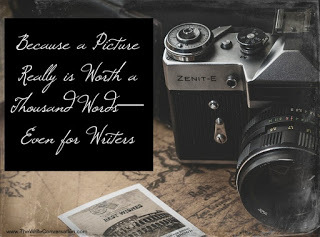 by Molly Jo Realy @RealMoJo68
by Molly Jo Realy @RealMoJo68Quick! What gets your attention faster: words or images? It’s the images, right? Those bright, colorful, brilliantly-captioned memes and photos.
As a writer, you may think photo-based social media sites are less helpful to your career, but it’s just the opposite. Capturing the moment can boost your readership, and give your fan base a quick idea of what you’re about. But you’re not just a writer, you’re a person with interests. So are your readers. Image posts are a fun way to find common ground outside the writer/reader relationship. Share those morning lattes, evening skies, pets . . . Whatever makes your world go ‘round and will entice your viewer/reader to connect with you.
Ah, but how does this help your writing, you ask? (And I’m so glad you did!) Here are a few ideas on how images and memes go hand-in-hand with the written word:Quirky memes with jokes, author quotes or book excerpts build interest in your current and upcoming projects.A simple photo of your family or writing desk draws readers into your world.Snap a picture of what you’re currently reading, and post it with a short review and tag the author.Have a favorite vacation spot? Readers love to travel, too. They’ll live vicariously through your posts.
You can tag friends and fellow authors, link back to their books, or share images of events you’ve attended together. Are you working on a mystery? Black and white, foggy environments can be a great attention-grabber when captioned with a line or two of your project. Do you knit or crochet as well as write? Post a photo of your newest blanket keeping you warm during the winter.
They say a picture is worth a thousand words. I say let your pictures lead them to your words.
With some sweet tea, a spoonful of honey, and a smart phone camera,~ Happy writing.
Molly Jo
TWEETABLESLet your #socialmedia pictures lead your audience to your words - @RealMoJo68 (Click to Tweet)
A Picture Really is Worth a Thousand Words - Even for Writers - @RealMoJo68 (Click to Tweet)
 Molly Jo is a writer, editor, social media ninja, and producer of the weekly Firsts in Fiction podcast. She has been featured in children’s magazines, on blogs and devotional websites, and her short stories have earned her awards and scholarships from nationally acclaimed writing programs. She is the founder of New Inklings Press and author of
The Unemployment Cookbook: Ideas for Feeding Families One Meal at a Time,
and other books available through her website and on Amazon.
Molly Jo is a writer, editor, social media ninja, and producer of the weekly Firsts in Fiction podcast. She has been featured in children’s magazines, on blogs and devotional websites, and her short stories have earned her awards and scholarships from nationally acclaimed writing programs. She is the founder of New Inklings Press and author of
The Unemployment Cookbook: Ideas for Feeding Families One Meal at a Time,
and other books available through her website and on Amazon.Her current work in progress, NOLA, is a location mystery set in New Orleans and is scheduled for publication in late 2016.
You can find her on Facebook, Twitter, Pinterest, and her blog, Frankly, My Dear . . .
Published on September 19, 2016 01:00
September 18, 2016
Obedience Here and Now
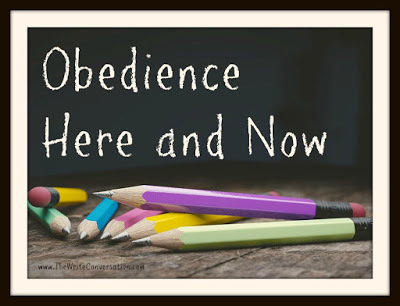 He who is faithful in very little is faithful also in much... Luke 16:10
He who is faithful in very little is faithful also in much... Luke 16:10When I was young all I wanted to be was a writer. As a matter of fact, I actually wrote my first novel in eighth grade…long hand, with a purple ink pen. But through the years, my dream of writing drifted farther and farther from the realm of reasonable possibilities, until I finally I gave up.
But as a young mother of three kids, God revived that call. At first I was scared, but then I got excited. Oh the plans I made—I’d write Bible studies and spend my time traveling, speaking and working for God.
I finished my first Bible study and the printer ink was barely dry before I had the manuscript in an envelope and on the way to publisher. I could see my future so clearly and I was on fire, with plans to do great things in His kingdom. All He had to do was open this one door.
 Not only did He not open that door, it seemed every other door had slammed shut and locked. It quickly became obvious that going and doing weren’t part of the call He’d placed on my life. Instead, the doors at home began to swing wide, as He invited me to share my story with those closest to me.
Not only did He not open that door, it seemed every other door had slammed shut and locked. It quickly became obvious that going and doing weren’t part of the call He’d placed on my life. Instead, the doors at home began to swing wide, as He invited me to share my story with those closest to me. As I swallowed my pride and became obedient to act where He’d placed me, the fruit began to grow. Years later, going and doing has become part of my call, but first I’d had to learn obedience and the difference between His will and mine.
TWEETABLE
Obedience here and now—with #writing and with life - @EdieMelson (Click to Tweet)
Published on September 18, 2016 01:00
September 17, 2016
Happy is the Soul...
 "Happy the soul that has been awed by a view of God's majesty." A.W. PinkAs many of you know, one of my hobbies is photography. I just love getting out with my camera and viewing the world through a different lens. Often it's been while looking at God's amazing creation that I've found the peace I've so desperately needed.
"Happy the soul that has been awed by a view of God's majesty." A.W. PinkAs many of you know, one of my hobbies is photography. I just love getting out with my camera and viewing the world through a different lens. Often it's been while looking at God's amazing creation that I've found the peace I've so desperately needed. I'd love for you to share a time when you've found joy gazing at God's creation.
Be sure to share your thoughts in the comments section below.
I invite you to use this image any way you like online. Post it to your blog, share it on Facebook, Twitter, Pinterest, anywhere you'd like. All I ask is that you keep it intact, with my website watermark visible.
Don't forget to join the conversation!
Blessings,
Edie
Published on September 17, 2016 01:00
September 16, 2016
Indie Publishing for Children's Writers
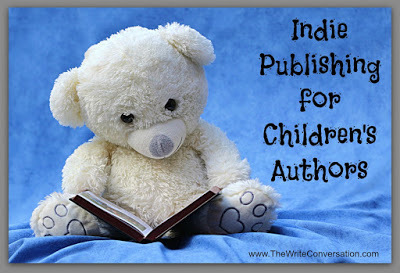 by Traci Tyne Hilton @TraciTyneHilton
by Traci Tyne Hilton @TraciTyneHiltonI was recently asked about marketing indie children’s books. I hated to say it, but I have never seen anyone do really, really well in the children’s ebook market.
Part of the reason is possibly the subscription service Amazon has called Amazon FreeTime. For just $2.99 a month parents get access to “10,000 kid-friendly books, movies, TV shows, educational apps, and games.” The indie with an ebook at even 99 cents has a hard time competing with that.
So should authors with products for youth just skip indie all together?Not necessarily, but they should for sure market like a traditional author. For an author of kids’ books—picture books, chapter books and the like—the mode of reaching your audience will be the same if you publish on your own or have a contract.
And it will be fun!
 Most of us indies sit in our bathrobes at Starbucks (er, or maybe that’s just me?) and click a few buttons to get an ad. Yawn.
Most of us indies sit in our bathrobes at Starbucks (er, or maybe that’s just me?) and click a few buttons to get an ad. Yawn.Children’s authors get to go to book fairs (contact homeschool fairs, curriculum fairs, regular fairs), libraries and schools (just email them! They are all dying to have great authors come visit-- especially the small private schools who can’t afford JK Rowling.) These authors get to go to small, local indie book shops for signings. (In this regard, a quality product and personable presentation will make up for a lack of recognizable publisher.) They get to do classroom talks for their friends who are teachers, they get to send free copies to every single reviewer they can think of or find.
The children’s book author-indie gets to have a blast. They get to work hard, of course, and they get to worry and fret and wonder if they will get any bites. They get to wear holes in the soles of their shoes travelling from location to location. They get to wear their knuckles out knocking on doors, but they get to interact with readers, a rare and wonderful treat in the indie world.
Don’t let the lack of immediate ebook success stop you from indie publishing your children’s books. And don’t let the idea of hard work stop you either—if your dream contract dropped in your lap, you’d have to work even harder!
TWEETABLEIndie #publishing for children's writers - @TracytyneHilton (Click to Tweet)
 Traci Tyne Hilton is the author of The Plain Jane Mysteries, The Mitzy Neuhaus Mysteries and the Tillgiven Romantic Mysteries. Traci has a degree in history from Portland State University and still lives in the rainiest part of the Pacific Northwest with her husband the mandolin playing funeral director, two busy kids, and their dogs, Dr. Watson and Archie Goodwin.
Traci Tyne Hilton is the author of The Plain Jane Mysteries, The Mitzy Neuhaus Mysteries and the Tillgiven Romantic Mysteries. Traci has a degree in history from Portland State University and still lives in the rainiest part of the Pacific Northwest with her husband the mandolin playing funeral director, two busy kids, and their dogs, Dr. Watson and Archie Goodwin.More of Traci’s work can be found at www.tracihilton.com
Published on September 16, 2016 01:00
September 15, 2016
No Free Passes in Publishing
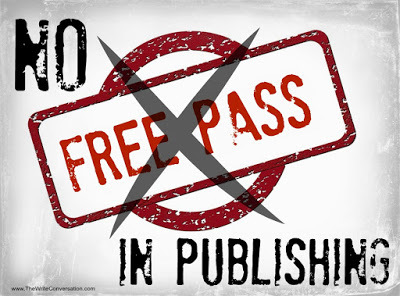 by Cyle Young @CyleYoung
by Cyle Young @CyleYoungThe publishing industry doesn’t give any free passes. Ever opportunity, conversation, meeting, email, and phone call has a price. Nothing is free for anyone.
What is the price? Time.
Time is the most valuable currency that a writer, publisher, editor, or agent has to give. Those emails, phone calls, etc. also have a finite price tag. Someone is on the clock somewhere, but those dollars are not as precious as time.When a writer meets with an agent or editor at a conference, it takes time away from that persons other tasks, family life, and/or work schedule.
When an author pitches an agent, it takes time. Every moment that agent spends looking over your submission is a slice of time they cannot devote to another task or project.
 Treat time like a commodity.Writers need to honor the value of other people’s time. Make it work for you and not against you. Don’t prod, prompt, or pester an editor or agent for more time. Be prepared to utilize every moment you have to connect. Treat time like a commodity.
Treat time like a commodity.Writers need to honor the value of other people’s time. Make it work for you and not against you. Don’t prod, prompt, or pester an editor or agent for more time. Be prepared to utilize every moment you have to connect. Treat time like a commodity.One of the most frustrating things for an editor or agent is to spend time reviewing submissions that are unprepared, not suitable for the agency or publisher, or ill-crafted. They can’t get that time back and it will cause your name to have a negative association with those persons.
Instead, take time to ensure you submit only adequate work that is well suited for your potential agent or editor. Don’t waste their time.
Remember also how limited time is and refuse the yearning to email the agent or editor for a detailed response or critique. That is not the role of an agent or editor and your lack of knowledge could be considered disrespectful of their time. Make sure to thank the agent or editor for the time he or she committed to your project and share that you look forward to submitting more projects in the future, if and when you have a project appropriate for their agency or publishing house.
Every conversation, contact, or email leaves a mark. The mark you want to leave is one of a respectful writer who understands the industry and respects peoples valuable time.
TWEETABLES
No free passes in #publishing - @CyleYoung on @EdieMelson (Click to Tweet)
Time is the most valuable currency that a writer, editor, or agent has to give - @CyleYoung (Click to Tweet)
 Cyle Young is thankful God blessed him with the uniqueness of being an ADD-riddled…SQUIRREL!...binge writer. Not much unlike the classic video game Frogger, Cyle darts back and forth between various writing genres. He crafts princess children’s stories, how-to advice for parents, epic fantasy tales, and easy readers.
Cyle Young is thankful God blessed him with the uniqueness of being an ADD-riddled…SQUIRREL!...binge writer. Not much unlike the classic video game Frogger, Cyle darts back and forth between various writing genres. He crafts princess children’s stories, how-to advice for parents, epic fantasy tales, and easy readers.
Published on September 15, 2016 01:00
September 14, 2016
The Value of a "Write Away"
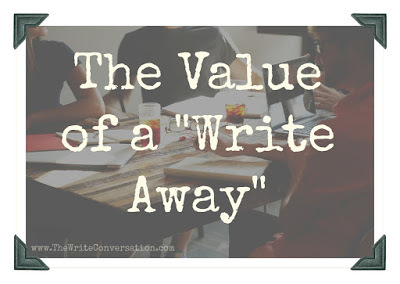 by Linda Gilden @LindaGilden
by Linda Gilden @LindaGildenI have a good friend who often says, “I’m going to be gone this week to a “write away.”
What you may ask is a “write away?” Simply put, it's a time set aside where you go somewhere and write away (in more ways than one)!
When you are in a writing slump and can’t seem to get the words flowing, maybe you need a change of scenery and routine.Recently my husband and I took a few days and went to the beach. We had no agenda but to catch up on work and enjoy our surroundings. The view was beautiful, you could hear the ocean when you opened the window, and the weather couldn’t have been nicer. We stayed in our pajamas all morning, swam every afternoon, and went out to eat for dinner. We are seafood lovers so the food was a delight. But for me, just not having to think about what to fix for supper was a blessing. I could get up and focus on my writing, write as long as I wanted, and then take a break to swim—my favorite form of exercise. I had taken a long “to do” list and enjoyed the time away more with every tick on the page.
You may be thinking to yourself—That’s fine for you but I can’t just run off to the beach for a few days. The good news is you don’t have to.
 I have a friend who lives on a lake just a short drive from my house. She has a beautiful home with an entire glass wall in her living room. The view is calming, relaxing, and extremely conducive to creativity. This sweet friend has given me an open invitation to come to her house and write any time I need to have a write away. Usually I just go for an afternoon or a day but occasionally I have camped out in one of her guest bedrooms for several days. I take whatever I want to eat and can stay in my writing uniform (pajamas) as long as I like. Do you have a friend you could visit for a write away?
I have a friend who lives on a lake just a short drive from my house. She has a beautiful home with an entire glass wall in her living room. The view is calming, relaxing, and extremely conducive to creativity. This sweet friend has given me an open invitation to come to her house and write any time I need to have a write away. Usually I just go for an afternoon or a day but occasionally I have camped out in one of her guest bedrooms for several days. I take whatever I want to eat and can stay in my writing uniform (pajamas) as long as I like. Do you have a friend you could visit for a write away?If not, why not find another friend who is also a writer or has another creative profession. Could you meet each other at a coffee shop or restaurant for the morning? Being with someone who is also creative will make your write away more interesting and more fun. You will find yourselves brainstorming throughout the day as you network and encourage each other. At the end of your time together, you will not only have had fun but also will have found you have been really productive.
No matter what method you choose, the benefits of taking a break from your normal routine are great. Does your creativity need a jumpstart? Plan a “write away” today.
TWEETABLESIn a #writing slump? A change of scenery might be what's needed - @LindaGilden (Click to Tweet)
The value of a #write away - via @LindaGilden on @EdieMelson (Click to Tweet)
 Linda Gilden is a wife, mother, and grandmother. Linda finds great joy (and lots of writing material) in time spent with her family and enjoys every opportunity for a short “write away.” Her favorite activity is floating in a pool with a good book surrounded by splashing children!
Linda Gilden is a wife, mother, and grandmother. Linda finds great joy (and lots of writing material) in time spent with her family and enjoys every opportunity for a short “write away.” Her favorite activity is floating in a pool with a good book surrounded by splashing children!To find out more about Linda, her writing, and her ministry, visit www.lindagilden.com. You can also connect with her on Twitter @LindaGilden and Facebook at Author Linda Gilden.
Published on September 14, 2016 01:00
September 13, 2016
4 Ways to Win Over Bad Reviews
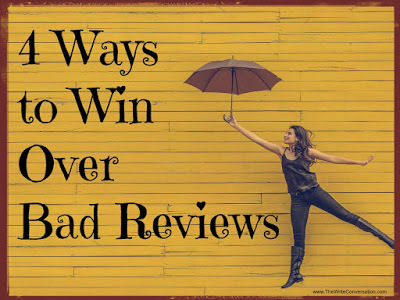 by Cindy Sproles @CindyDevoted
by Cindy Sproles @CindyDevotedIt’s a given that reviews on our books are vitally important. Future readers scan through to look for the gem that might be their next read. When our book hits Amazon for the first few weeks we relentlessly look over reviews finding ourselves grinning with joy or sobbing relentlessly. The important thing to remember is reviews are not personal – they’re a necessary evil with awesome advantages both pro and con. So how do we win out over the review snobs?When writers birth their book baby, they become doting parents and rightfully so. Months of work have gone into the process of creating, editing and publishing this book. When review time comes authors become a bit . . .uh . . . sensitive.
Reviews come in a number of ways but each has its reasoning. Taking time to understand the uses of reviews will save you hours of sobbing and light the fire you need to seek out more.
4 Ways to Win Over Bad Reviews1) “1 Star – If I could give it zero stars, I would. Not worth the ink on the page.” – Ahhhh! Your heart sinks and you dart for the bathroom to throw up. Someone said your book wasn’t worth the ink on the page. Yea, well, that’s a pretty nasty review, but how do you respond? Fast answer: You don’t. As much as you want to defend your baby . . .don’t.
Keep in mind there are always Debbie Downers. Some even attack you personally. This is your opportunity to rise above and remember you never know what is going on in that person’s life. The most you can do is simple. “Thank you for your review. I appreciate your time.” This lets the reviewer know you read the review and that you aren’t going to fall in the argument trap. Being gracious is never a mistake.
 Why can't I defend my work?2. “WHY CAN’T I DEFEND MY WORK?” It’s simple. Besides being a grown up, bigger, better person? You need bad reviews. WHAT? Yes. You need bad reviews. Here’s why.On Amazon, two things happen with reviews:Future readers gain validity from reviewsWhen they see all 5 star reviews they assume your family and friends love your book. Mix in some 1 and 2 star reviews and now we have validity. Others who may not know you are reading and responding. The future reviewer now sees a scale that looks balanced. When they purchase a book with mixed reviews they know there is room for their personal opinion, likes and dislikes.Reviews (any reviews) draw the Amazon eye to your book Your publisher is squawking, “Get reviews”, and there’s a reason. The more reviews, good or bad, again, draw the all-powerful Amazon eye to your book, causing them to feature your book in suggestion notes when a reader purchases. Those who purchased Book X have also purchased Book Q. You want your book in these suggestion notes. The more suggestions future readers see, the more they take interest and purchase. It’s like an Amazon stamp of approval on your book. Books sometimes scroll at the bottom of the Amazon page too. Excellent exposure.
Why can't I defend my work?2. “WHY CAN’T I DEFEND MY WORK?” It’s simple. Besides being a grown up, bigger, better person? You need bad reviews. WHAT? Yes. You need bad reviews. Here’s why.On Amazon, two things happen with reviews:Future readers gain validity from reviewsWhen they see all 5 star reviews they assume your family and friends love your book. Mix in some 1 and 2 star reviews and now we have validity. Others who may not know you are reading and responding. The future reviewer now sees a scale that looks balanced. When they purchase a book with mixed reviews they know there is room for their personal opinion, likes and dislikes.Reviews (any reviews) draw the Amazon eye to your book Your publisher is squawking, “Get reviews”, and there’s a reason. The more reviews, good or bad, again, draw the all-powerful Amazon eye to your book, causing them to feature your book in suggestion notes when a reader purchases. Those who purchased Book X have also purchased Book Q. You want your book in these suggestion notes. The more suggestions future readers see, the more they take interest and purchase. It’s like an Amazon stamp of approval on your book. Books sometimes scroll at the bottom of the Amazon page too. Excellent exposure.The more reviews you gain the better opportunity for your book. But here’s the problem. Getting readers to post the reviews. Reviews must be original and new, so readers are left to take this final step after the book is done. Since you can’t post reviews for your readers, how do we get those posts on the sites? Here are a few suggestions:During the editorial process, add a line at the end of the book that offers your reader an incentive to post a review. Thank you for reading Book X. Please consider posting a review on major sites like ChristianBooks.com, Amazon, and Barnes & Noble. Send us a screenshot of your review and we’ll send you a free digital download preview of Book B. You’ll have to work with your publisher, but together you can find a great wording and a an incentive that costs nothing to them and means tons to your readers.Set goals on Facebook. Post to your tribe your starting goal is 50. Help me jumpstart my book on Amazon by posting a review. 50 is the magic number. Post a review and I’ll add your name to a drawing for ___________________.Tweet your url and contest.
Does this guarantee reviews? No. But its effort that helps. Remember social media grows weary of over promotion, so don’t beat your readers over the head with massive amounts of posts. Post once or twice, a week or so apart. Then wait.
The fact of the matter is, marketing is what it is – ultimately left in the hands of the consumer to pay attention and purchase. The more effort you put into the marketing, the more books you will sell.
 Consider every review a blessing & a gift.3. But what about the bad reviews? Stop asking. Consider every review a blessing and a gift. If you must think of it, then think a little on the greedy side this once. A bad review means your book was more than likely purchased. That puts a small financial drop in your bucket. A bad review means your reader has at least read a good chunk of your work. Folks are reading and every review draws the Amazon eye to your book. These are good things.
Consider every review a blessing & a gift.3. But what about the bad reviews? Stop asking. Consider every review a blessing and a gift. If you must think of it, then think a little on the greedy side this once. A bad review means your book was more than likely purchased. That puts a small financial drop in your bucket. A bad review means your reader has at least read a good chunk of your work. Folks are reading and every review draws the Amazon eye to your book. These are good things.When you get a bad review, encourage new reviews to push the bad one down into the mix. It’s a bit less visible but still vitally important. If you can push it down a notch then readers see a positive review first.
We can’t force readers to review but we can continue to encourage them to take this step. You get a bad review . . . lick your wounds and remember to rejoice. The book was purchased and read. Brush it off and move ahead.
4. Words of wisdom if reviews are primarily rough, perhaps there is a problem to address. It might be time to take a second look, especially if this is a self-published read.
Now, wipe your tears and remember bad reviews are important to the success of your book. Rejoice the book is being read. Let the scales balance and the reviews roll. You’ll win over the review snobs with ease.
TWEETABLE4 Ways to Win Over Bad Reviews - @CindyDevoted on @EdieMelson (Click to Tweet)
 Cindy Sproles is an award-winning author and popular speaker. She is the cofounder of Christian Devotions ministries and managing editor of Straight Street Books and SonRise Devotionals, imprints of Lighthouse Publishing of the Carolinas. Cindy is the executive editor of www.christiandevotions.us and www.inspireafire.com. She teaches at writers conferences nationwide and directs The Asheville Christian Writers Conference - Writers Boot Camp.
Cindy Sproles is an award-winning author and popular speaker. She is the cofounder of Christian Devotions ministries and managing editor of Straight Street Books and SonRise Devotionals, imprints of Lighthouse Publishing of the Carolinas. Cindy is the executive editor of www.christiandevotions.us and www.inspireafire.com. She teaches at writers conferences nationwide and directs The Asheville Christian Writers Conference - Writers Boot Camp. She is the author of two devotionals, He Said, She Said - Learning to Live a Life of Passion and New Sheets - Thirty Days to Refine You into the Woman You Can Be. Cindy's debut novel, Mercy's Rain, is available at major retailers. Visit Cindy at www.cindysproles.com and book her for your next conference or ladies retreat. Also connect with her on Facebook and Twitter.
Published on September 13, 2016 01:00
September 12, 2016
When Social Media Just Makes You Tired
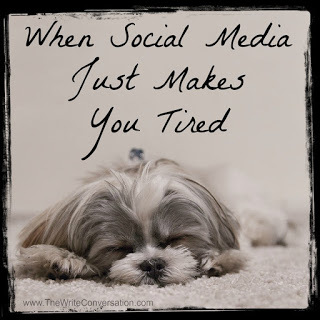 by Edie Melson @EdieMelson
by Edie Melson @EdieMelsonI know, I’m supposed to be the cheerleader of all things social media. But let’s get real here. Some days—some weeks—it just makes me tired. Usually it happens when certain situations arise:I haven’t had any meaningful conversations in a while.My updates seem to be going into a black hole because no one is noticing them.Life in general has gotten chaotic and it’s squeezing the life out of me.My numbers aren’t moving up, they’re sitting there like an old tire in a mud hole.It seems like everything I read on social media is rude, wrong, or just plain shallow.
Yeah, I’ve been where you are.But I’ve also come through it to the other side. There are some things to do when social media gets to be too much to deal with. Here is what I do when it becomes just too much work.
Social Media Strategies for the Weary1. Take a 3-day break. Don’t stay off too long, but I’ve discovered giving myself a short 3-day vacation gives me the time I need to regroup. The permission to not open FB or Twitter is almost exhilarating. One thing about this though, don’t advertise it. Don’t get on FB and tell everyone you’re getting off for 3 days. That falls into the category of noise, not meaningful conversation on social media. Just quietly take a few days off.
2. Set a timer. When you return, watch your . . . er . . . watch. Don’t try to make up for lost time. Instead be very deliberate about the time you’re on. Don’t let it go over 30 minutes a day. The one caveat to this is if you reserve a social media network for only play. I know some who love Pinterest or Instagram and only use it for personal enjoyment. If that’s the case, separate that time from your work time.
3. Reply to those who’ve mentioned you. If they’ve shared your blog, retweeted, commented on a FB post, or whatever. Take about 5 minutes and pick out a few to thank.
4. Share something meaningful to you. Don’t try to anticipate what will get the most traffic humming. Just be transparent. Post a pic from childhood, share a quote, ask a question.
5. Evaluate your social media content Look again at what you’re sharing. Spend some time looking for new places to visit online—blogs, websites, etc. Shake things up a bit. You will enjoy it and so will your audience.
6. Change when you schedule your social media. If you normally schedule it in the morning, move that to late afternoon. Streamline what you can, but remain disciplined in your consistency. A change in routine can help shake things up in a good way.
Social media is a tool. It’s a valuable tool when we use it correctly. But like any good worker, we can’t just use one implement to get the job done. Sometimes we must put it down and pick up another one.
Remember also that being a writer—like any other career/hobby choice—has aspects to it that aren’t fun. There isn’t anything out there that’s one hundred percent fun one hundred percent of the time. So do the work that dreary, and focus on the reason you write.
I’d love to hear your thoughts on what to do when social media just makes you tired. Leave your thoughts in the comments section below.
Don’t forget to join the conversation!Blessings,Edie
TWEETABLESWhen #socialmedia just makes you tired - @EdieMelson (Clickto Tweet)
6 #SocialMedia strategies for the weary - @EdieMelson (Click to Tweet)
Published on September 12, 2016 05:49



